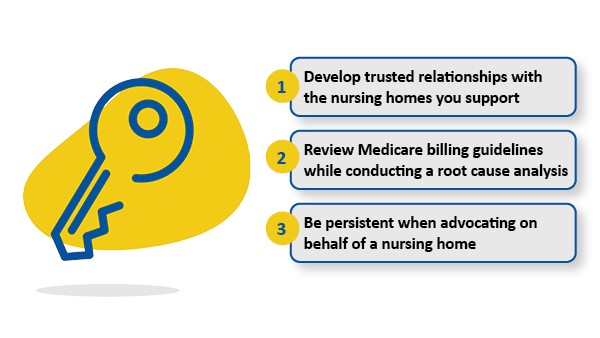A midsize long-term care facility on the West Coast was referred by the Centers for Medicare & Medicaid Services (CMS) to Comagine Health, a Quality Innovation Network-Quality Improvement Organization (QIN-QIO), for assistance with increasing nursing home resident COVID-19 vaccinations. Despite many facility residents agreeing and consenting to vaccination, the nursing home’s resident immunization rate was lagging several similar facilities in the region. As a result of Comagine Health’s assistance, the facility saw a 39.29 percent net increase in its resident COVID-19 vaccination rate, from the time nursing home was referred to Comagine Health and the last report to the National Healthcare Safety Network in February 2024.
Comagine Health had established a trusted partnership with the nursing home leadership through prior emergency preparedness planning support, which paved the way for direct communication. It was through this channel that Comagine Health first identified the primary cause of the facility’s low vaccination rate – they were not getting reimbursed for vaccinations for residents covered by a specific health maintenance organization (HMO) insurance provider.
Over the course of two months, Comagine Health engaged in collaborative dialogue with facility leadership, the pharmacy manager at the nursing home’s contracted pharmacy and key stakeholders at the HMO. Through these conversations, Comagine Health uncovered a variety of barriers and obstacles that contributed to the pharmacy’s inability to directly bill and receive appropriate reimbursement for vaccinations and consequently the nursing home as well. Most importantly, the QIN-QIO discovered that a system oversight during a network transition left the pharmacy inadvertently excluded from the HMO-covered network resulting in the inability to direct bill and appropriately reimbursed.
This backend error triggered billing obstructions for COVID-19 as well as influenza and pneumococcal vaccines. After multiple inquiries and discussions, Comagine Health was able to assist in resolving the issue and ensuring the pharmacy was enrolled with the HMO-covered network. To bring the collaborative outcome full circle, a vaccine clinic was held, and the nursing home and pharmacy are aligned on billing requirements and procedures to ensure the HMO-insured residents have access to the needed vaccines.
Due to Comagine Health’s persistence, the HMO insured residents were vaccinated for COVID-19, resulting in an 8 percent increase in the facility’s resident COVID-19 vaccination rate for the week ending March 17, 2024. The nursing home is now also assured that COVID-19, influenza, and pneumococcal vaccines will be provided with full reimbursement and zero out of pocket costs for the pharmacy and the nursing home.
Many skilled nursing facilities (SNF) and pharmacies are encountering obstacles related to vaccination billing. This Medicare resource explains how Medicare pays for vaccines administered during a resident’s stay in a nursing home. Use these Medicare billing guidelines as a checklist when inquiring about vaccine reimbursements. Note that vaccine payment depends on the type of vaccine and whether the patient is using their SNF Part A benefit. This document doesn’t cover vaccine payment by Medicare managed care, Medicaid, or commercial insurance.

Keys to Success
Comagine Health’s success can be replicated by taking the following steps:
- Develop trusted relationships with the nursing homes you support
- Review Medicare billing guidelines while conducting a root cause analysis
- Be persistent when advocating on behalf of a nursing home
Regional Impact of Comagine Health’s Efforts
Per the NHSN weekly report dated March 24, 2024, the percentage of residents who are up to date in nursing homes that received assistance from Comagine Health increased by 8.6% percent as compared to the average change in resident vaccination across all nursing homes in Comagine Health’s region.
This material was prepared by The Bizzell Group (Bizzell), the Data Validation and Administrative (DVA) contractor, under contract with the Centers for Medicare & Medicaid Services (CMS), an agency of the U.S. Department of Health and Human Services (HHS). Views expressed in this material do not necessarily reflect the official views or policy of CMS or HHS, and any reference to a specific product or entity herein does not constitute endorsement of that product or entity by CMS or HHS. 12SOW/Bizzell/DVA-1343-04/16/2024.

